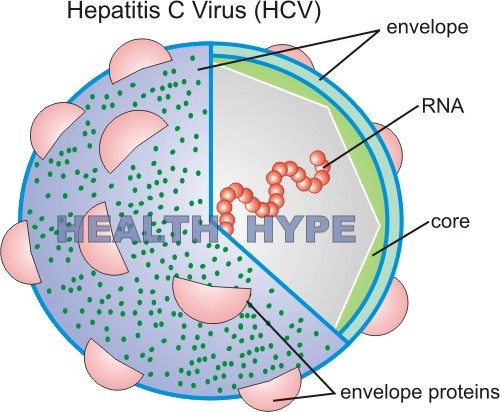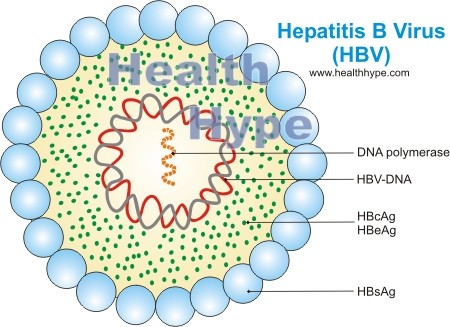Hepatitis A, B, C Lab Tests, Results and Meaning
Hepatitis is an inflammation of the liver and may be due to a number of insults, from chemical irritants, to infections and autoimmune mechanisms. Viral hepatitis is one of the most common forms of liver inflammation and is caused by an infection with a virus. Although many different types of viruses can cause viral hepatitis, it is the hepatitis viruses A, B and C that are usually responsible. These hepatitis viruses have an affinity for the liver, unlike other viruses which may infect a number of sites in body including the liver.
Viral hepatitis is a common infection of the liver seen throughout the world. Hepatitis A is contracted via the orofecal route when food or water contaminated with the hepatitis A virus (HAV) is ingested. Hepatitis B and C is transmitted through infected bodily fluids including blood, semen and less frequently through saliva. Vertical transmission, which is the spread from mother to child, are also common routes of transmission of hepatitis B and C. Some forms of viral hepatitis, like hepatitis A, causes an acute infection and recovery is usually quick without permanent damage to the liver. However, with other common types, hepatitis B and C specifically, chronic infection is frequently seen with permanent and irreversible damage to the liver. This eventually leads to chronic liver disease like liver cirrhosis, increases the chance of liver cancer and can end with liver failure.
Antigens and Antibodies
The hepatitis virus is a protein structure containing the viral genome, either DNA or RNA, which is passed into a host cell. The genome contains the relevant information of the viral structure and the host cells resources are used to produce new viruses. The proteins in the virus are known as antigens. When the body is exposed to these antigens, the immune system makes antibodies against it.
These antibodies are protein ‘tags’ that attach to the virus and helps to guide the various immune cells in attacking the virus. The hepatitis viruses has several envelope proteins on the outer covering known as the surface antigens with inner proteins known as the core antigens. The immune system may produce antibodies against both the surface antigens and/or core antigens.
There are two types of antibodies that are important markers of acute and chronic infection. The first is the IgM antibody which appears early in an infection as it it indicates the primary immune response. It is an important diagnostic marker of an acute infection or detection of the virus during the incubation period when there are no symptoms (asymptomatic). IgG antibody is formed later in the infection as it is involved predominantly in the secondary immune response. It is an indicator of previous infection and often immunity to the causative pathogen.
Hepatitis A Tests
Venous blood is collected when hepatitis A infection is suspected or if immunity needs to ascertained prior to administration of the vaccine. The blood sample is then sent for testing. Three tests can be conducted on this blood sample to verify HAV infection. This includes :
- HAV-Ab IgM : hepatitis A virus antibody (IgM type)
- HAV-Ab Total : both hepatitis A virus IgM and IgG types
Since there is no test specifically for the IgG antibody, a positive total antibody test when the IgM antibody test is negative is indicative of previous infection and/or immunity. IgM antibodies develop after 2 to 3 weeks of contracting the infection and may be present between in the blood for about 2 to 6 months, with levels dropping significantly after the third month. IgG antibodies in HAV infection also develops early in the disease, anywhere between week 1 to 3 and can persist for life.
Meaning of the Test Results
- HAV IgM POSITIVE : Acute hepatitis A virus infection
- HAV IgM NEGATIVE and,
- Total HAV-Ab POSITIVE : Either acute HAV infection if IgM bodies are positive and symptoms are present OR it indicates immunity if a person has previously had hepatitis A and there are currently no symptoms.
- Total HAV-Ab NEGATIVE : No current HAV infection and no previous HAV infection.
Hepatitis B Tests
The most comprehensive set of tests for viral hepatitis exists for hepatitis B. Tests can identify the different viral antigens, antibodies to these antigens and the DNA of the virus. This is discussed in detail under hepatitis B antigens and antibodies. The compendium of tests allows for diagnosis and monitoring of hepatitis B, both in the acute and chronic settings.
Meaning of Test Results
- Hepatitis B surface antigen (HBsAg) POSITIVE : acute HBV infection and chronic HBV infection.
- Hepatitis B surface antibody (anti-HBs) POSITIVE : previous HBV infection and HBV immunity.
- Hepatitis B core antibody IgM (anti-HBc IgM) POSITIVE : acute HBV infection
- Hepatitis B core antibody total (anti-HBc total) POSITIVE : acute HBV infection and chronic HBV infection
- Hepatitis B envelope antigen (HBeAg) POSITIVE : indicates infectivity and effectiveness of treatment
- Hepatitis B envelope antibody (anti-HBe) POSITIVE : chronic hepatitis B and effectiveness of treatment
- Hepatitis B DNA (HBV-DNA) POSITIVE : active HBV infection and effectiveness of treatment in chronic infections
Hepatitis B tests are usually done in various combinations for greater accuracy and allows for a more detailed interpretation. This is as follows :
- Acute HBV infection : HBsAg, anti-HBc and sometimes HBeAg
- Chronic HBV hepatitis : HBsAg, HBV-DNA and sometimes HBeAg
- Chronic hepatitis B progression : HBsAg, HBeAg, anti-HBs IgG, anti-HBe IgG and HBV-DNA
- Chronic hepatitis B treatment monitoring : HBsAg, HBeAg, anti-HBs IgG, anti-HBe IgG and HBV-DNA
- Previous HBV exposure : anti-HBc total and anti-HBs
Hepatitis C Tests
Several tests also exist for diagnosing hepatitis C. Routine screening by identifying antibodies to the HCV antigens may be done with the HCV antibody test (anti-HCV test) and then confirmed with the HCV RIBA test. The HCV RNA tests, qualitative and quantitative, confirms the presence of the viral genetic particles and also measures the quantity. This is useful in monitoring the progression of the diseases and effectiveness of treatment. HCV genotyping will identify which of the six genotypes of HCV is present and therefore responsible for the infection.
Meaning of Test Results
- HCV antibody (anti-HCV) POSITIVE : hepatitic C virus infection but needs to be confirmed with HCV RIBA to discount a false-positive.
- HCV recombinant immunoblot assay (HCV RIBA) POSITIVE : current or previous HCV infection
- HCV RNA (Qualitative) POSITIVE : current infection
- HCV Viral Load (RNA Quantitive) : value indicates severity of condition prior to treatment and maps out the effectiveness of treatment.





